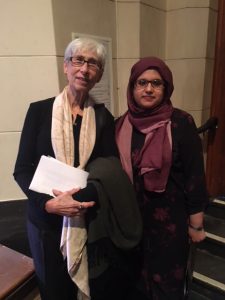A long line circled St. Andrew’s Wesley United Church in Vancouver Oct. 26, an hour and a half before showtime, to see Roger Waters. They were not there to hear the music of the man behind Pink Floyd’s greatest music, but to listen to him talk. A few days before the final two dates of his cross-Canada Us and Them tour – the final leg of a larger North American tour that kicked off almost a year ago – the 74-year-old Waters agreed to schedule a talk to discuss the political cause he has become infamous for: the Israel-Palestine conflict.
Some members of the Canadian Jewish community were less than happy about his speaking. B’nai Brith presented a documentary about him called Wish You Weren’t Here and followed him around Canada, showing it in conjunction with his concerts. The week before the talk, the Centre for Israel and Jewish Affairs sent out a mailing identifying Waters as “the rock musician obsessed with boycotting Israelis” who has become “the face of the hateful BDS (boycott, sanctions and divestment) movement.” An online petition called for the talk to be cancelled.
Meanwhile, other members of the Jewish community mobilized to support the event, which had been initiated by Independent Jewish Voices (IJV), a group that advocates for Palestinian human rights and supports BDS.
READ: WATERS TAKES AIM AT BB CEO AT SECOND TORONTO SHOW
Waters became a fierce partisan for BDS in 2006 after playing in Israel. Since then, he has earned the opprobrium of Jewish organizations that believe the movement to be inherently anti-Semitic, and Waters to be more of the same.
Waters was interviewed on stage by Martha Roth of IJV Canada, and Itrath Syed, a professor at Langara College with a focus in Muslim and feminist studies.
“At every gig I’ve done in Canada so far,” Waters opened, “I’ve said that there are many things I like about this great country.” Waters then lost no time launching into a discussion of BDS, which he characterized as “a just cause” that was “shining a light on the truth.”

Addressing his BDS support, Waters said, “It’s been a long, quite trying, difficult road, not nearly as hard and trying, obviously, as living under occupation. The blackening of my name is just one more way of obscuring the truth. They want to stop the public discourse about what happened in (1947-48), what happened in ‘67, in ‘73, what’s happening now.”
Waters had words of praise for Jewish BDS activists, saying, “People like Independent Jewish Voices and Jewish Voices For Peace have organized and rallied people, and slowly, slowly over the years the demographics have changed. If you look at polls now, you find that younger Jewish people are no longer looking at the situation and not seeing anything. They’re saying, ‘This is not what Judaism is about. This does not represent the way I feel. It goes against everything I believe in with my heart. I am a human being, I am humane and I do not want my people or anyone who pretends to represent me to behave like this.’ It’s happening and it lightens my heart every time I hear someone speak out. It’s great.”
Waters’ talk was not limited to BDS, but ranged over his genesis as a social justice activist, U.S. President Donald Trump and the stories behind some of his recent political songs.

Outside the church, a small group of protesters gathered. One came into the talk, unfurled a blue and white banner that read ‘Boycotts Will Not Scare Us – Am Yisrael Chai’ and was peacefully ejected. The rest remained outside, draped in Israeli flags and, by the end of the talk, had dwindled to a group of half a dozen. Israeli Lives Matter, read a sign held by a distraught college-aged Israeli, who told me what was going on inside was “just like Nazi Germany.”
Waters closed the night with a fiery diatribe, met with a standing ovation, where he said that all problems came down to the split between those who love other people and “those who love stuff.”
Waters continued, “These conflicts are not about religion, not about borders; they are about who has and who doesn’t. Don’t let anybody tell you different.”
